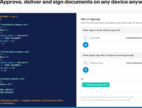GDPR: 5 Things to Monitor on Your Journey to Compliance
by Mashum Mollah Management 13 July 2020

Since May 2018, in the wake of a number of devastating data breaches that impacted thousands of individuals across the globe, GDPR has influenced many longstanding practices and policies in a bid to give people more clarity and control over how businesses use their personal data.
Remaining compliant with the new regulations has been a challenge for many businesses, but they need to avoid a disastrous data breach and potentially catastrophic fine has facilitated a revolution within the realm of data management and cybersecurity. Read more below about some of the most important areas of your business to monitor in order to remain GDPR compliant.
Here are GDPR: 5 Things to Monitor on Your Journey to Compliance:
1. Regular Auditing
Routinely auditing the way your data is stored, processed, and collected may seem like a drain on time and resources, but one need only consider a few of the recent high-profile data breaches to remember how important it is to be aware of your data protection responsibilities.
Once your data handling processes have been reviewed, it is then possible to perform a GDPR gap analysis, which will serve to make you aware of weaknesses in your systems and processes and, in turn, areas that risk a GDPR breach.
2. Staff Training
Just recently, human error has been linked to approximately 60% of security breaches or cyber-attacks. For a business to remain compliant with GDPR — and, by extension, protected against the ever-evolving threat of the digital landscape — employees must be armed with an up-to-date and accurate understanding of the many threats that risk undermining the company, and the personal information pertaining to its employees and customers.
GDPR, data security, and the prospect of a serious data breach can impact members of staff as well as members of the public, and regular training is integral to adhering to GDPR, and keeping the company safe from malicious online attacks.
3. Review Employment Contracts and Policies
Similarly, your GDPR compliance responsibilities extend beyond customer data. Your employee contracts — and your company policies surrounding the storage of their data — should also be monitored closely. Regularly evaluate documents such as privacy notices for employees, contractors and job candidates, employment contracts, and company policies for areas pertaining to privacy, such as CCTV and IT surveillance.
4. Your Responsibilities with International Data Transfers
Moving data overseas carries its own risks, and it is essential that you have an adequate policy for international data transfers in place in order to mitigate the threat of a breach as much as possible. Some countries are not subject to such strict data laws; sufficient measures for safeguarding this transfer must be routinely revisited before any data changes hands.
5. Legalities
The high-profile cases of data breaches and penalties serve as a reminder of the importance of maintaining compliance with GDPR — not just for your clients and staff, but for the continued growth and success of your company. However, constant vigilance represents a significant call upon your time and resources, which is why many companies choose to consult a lawyer who can offer an in-depth understanding of the requirements, and assist you in creating better policies surrounding data storage and collection, and up-to-date contracts.
Willans.co.uk, for instance, has a wealth of experience in developing data protection policies, drafting data processing agreements, and conducting gap analyses to ensure that the business is safeguarded against the constant threat of a serious breach.
Read Also:







































































































